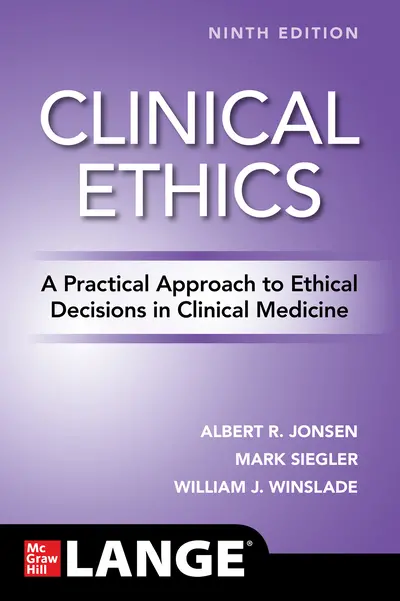My Account Details

ISBN10: 1260457540 | ISBN13: 9781260457544

Step 1 . Download Adobe Digital Editions to your PC or Mac desktop/laptop.
Step 2. Register and authorize your Adobe ID (optional). To access your eBook on multiple devices, first create an Adobe ID at account.adobe.com. Then, open Adobe Digital Editions, go to the Help menu, and select "Authorize Computer" to link your Adobe ID.
Step 3. Open Your eBook. Use Adobe Digital Editions to open the file. If the eBook doesn’t open, contact customer service for assistance.
The go-to textbook on the increasingly important and rapidly evolving topic of medical ethics
A Doody's Core Title for 2024 & 2023!
Ethical issues are embedded in every clinical encounter between patients and clinicians. In order to practice excellent clinical care, clinicians must understand ethical issues such as informed consent, decisional capacity, surrogate decision making, truth telling, confidentiality, privacy, the distinction between research and clinical care, and end-of-life care. This popular, clinically-oriented guide provides crystal-clear case-based coverage of the ethical situations encountered in everyday medical practice.
Clinical Ethics introduces the proven Four Box Method—a much-needed pattern for collecting, sorting, and ordering the facts of a clinical ethical problem. This easy-to-apply system is based on simple questions about medical indications, patient preferences, quality of life, and contextual features that explain clinical ethics and help clinicians formulate a sound diagnosis and treatment strategy. In each chapter, the authors discuss case examples and provide analysis, comments, and specific recommendations.
The book is divided into the four topics that constitute the essential ethical structure of every clinical encounter:
- Medical Indications
- Preferences of Patients
- Quality of Life
- Contextual Features
Introduction
The Four Topics
Ethical Reasoning in Clinical Ethics
Resources in Clinical Ethics
Acknowledgements
Bibliography
The Four Topics Chart
TOPIC ONE
Medical Indications
1.1 Indicated and Nonindicated Interventions
1.2 Clinical Judgment and Clinical Uncertainty
1.3 Cardiopulmonary Resuscitation and Orders not to Resuscitate
1.4 Medical Error
1.5 Determination of Death
1.6 Summary
TOPIC TWO
Preferences of Patients
2.1 Informed Consent
2.2 Decisional Capacity
2.3 Decision Making for the Mentally Incapacitated Patient
2.4 Surrogate Decision Makers
2.5 Failure to Cooperate in the Therapeutic Relationship
TOPIC THREE
Quality of Life
3.1 Divergent Evaluations of Quality of Life
3.2 Enhancement Medicine
3.3 Compromised Quality of Life and Life-Sustaining Interventions
3.4 Pain Relief for Terminally Ill Patients
3.5 Medically Assisted Dying
3.6 Suicide
TOPIC FOUR
Contextual Features
4.1 Health Professions
4.2 Other Interested Parties
4.3 Confidentiality of Medical Information
4.4 Economics of Clinical Care
4.5 Allocation of Scarce Health Resources
4.6 Influence of Religion on Clinical Decisions
4.7 Role of Law in Clinical Ethics
4.8 Clinical Research and Education
4.9 Public Health
4.10 Organizational Ethics
Need support? We're here to help - Get real-world support and resources every step of the way.
